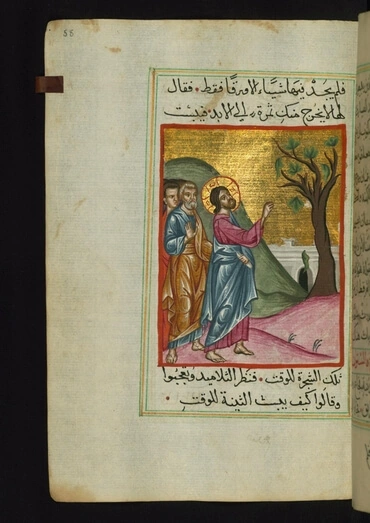885. That 'a leaf' means truth is clear from various places in the Word, where man is compared to or actually called a tree. 'Fruit' in those contexts means the good that stems from charity, and 'leaf' the truth deriving from this, for these are indeed like fruit and leaves, as in Ezekiel,
Beside the river there is rising up upon its bank, on this side and on that, every tree for food, whose leaf does not fall, nor its fruit fail, but is reborn monthly, for its waters flow out from the Sanctuary, and its fruit will be for food, and its leaf for medicine. Ezekiel 47:11; Revelation 22:1.
Here 'tree' stands for the member of the Church who has the Lord's kingdom within him, 'fruit' stands for the good that stems from love and charity, 'leaf' for truths deriving from that good which serve to instruct the human race and to regenerate it. And because truths do this the leaf is said to be 'for medicine'. In the same prophet,
Will He not pull up its roots and cut off its fruit so that it withers? And all the plucked off (leaves) from its off-shoot will wither. Ezekiel 17:9.
The subject here is the vine, which is the Church, when it has been vastated, whose good, which is 'the fruit', and its truth, which is that 'plucked off from its off-shoot', thus wither away.
[2] In Jeremiah,
Blessed is the man who trusts in Jehovah. He will be like a tree planted beside the waters. His leaf will be green, and in the year of scarcity he will not be anxious. Nor will he cease to bear fruit. Jeremiah 17:7-8.
'Green leaf' stands for the truth of faith, and so for faith itself which derives from charity. The same applies in David, Psalms 1:3. In the same prophet,
There will be no grapes on the vine, nor figs on the fig tree, and its leaf has fallen. Jeremiah 8:13.
'Grapes on the vine' stands for spiritual good, 'figs on the fig tree' for natural good, 'leaf' for truth, which has accordingly fallen. Likewise in Isaiah 34:4. Similar things were meant by 'the fig tree' that Jesus saw, which was made to wither away when He found nothing but leaves on it, Matthew 21:20; Mark 11:13-14. The Jewish Church in particular was what 'the fig tree' was used to mean on that occasion. With this Church no natural good existed any longer, only that preserved with them which was meant by 'a leaf', namely doctrine, or truth, concerning faith. A Church that has been vastated is one that knows truth but has no wish to understand it. They are like people who say they know the truth, or matters of faith, but who possess no good at all that stems from charity. They are merely 'fig leaves', and they wither away.







